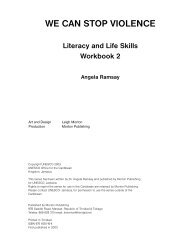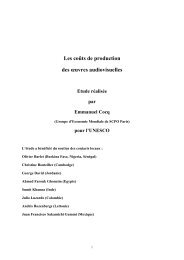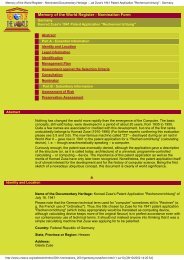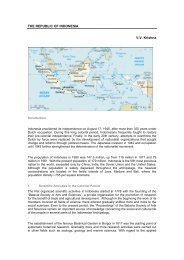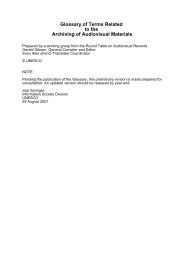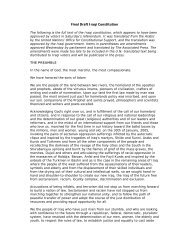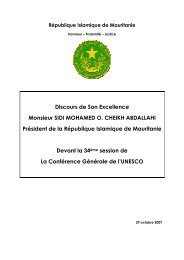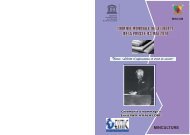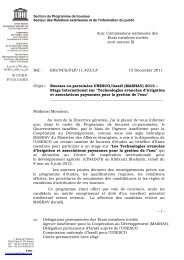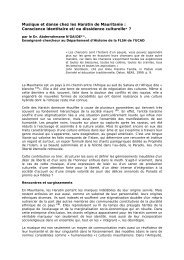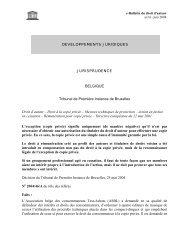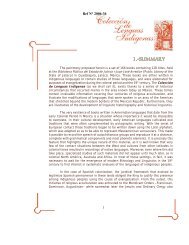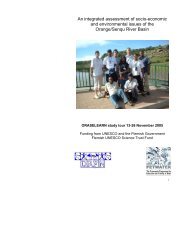Accepted Papers - 3.pdf - UNESCO
Accepted Papers - 3.pdf - UNESCO
Accepted Papers - 3.pdf - UNESCO
Create successful ePaper yourself
Turn your PDF publications into a flip-book with our unique Google optimized e-Paper software.
National Seminar on Rainwater Harvesting and Water Management 11-12 Nov. 2006, Nagpur<br />
81. Public Awareness on Rain Water Harvesting<br />
- A Case Study in Chennai City<br />
GENERAL<br />
Water is life and blood of our environment and<br />
without water no living being can survive. Water is<br />
finite resource and cannot be replaced/duplicated<br />
and produced on commercial scale. Ground water<br />
is the largest reservoir of fresh water on the planet.<br />
It immensely contributes to India’s development and<br />
economy. It meets 85% of drinking water needs of<br />
rural India. It sustains 60% of irrigated agriculture<br />
and plays an important role in social equity and<br />
poverty reduction.<br />
The phenomenon of human induced ground<br />
water extraction due to excessive development led<br />
* A. Jebamalar **Dr. G. Ravikumar<br />
ABSTRACT<br />
Any initiative involving the public in a mass scale will be successful only when the<br />
public themselves are consulted and are participating in every process. As the stakeholders,<br />
their involvement has been necessitated, in the recent times, in any water related initiative.<br />
This paper attempts to bring out the importance of public awareness in the implementation<br />
of rain water harvesting. Government, though it represents the public, may not be in a<br />
position to deal with such water related issues out and out by itself. Understanding this,<br />
Tamil Nadu Government made rain water harvesting (RWH) as mandatory by the public.<br />
This paper focuses on public awareness for RWH implementation in Padmavathi Nagar of<br />
Chennai City.<br />
A nondisquised structured questionnaire was prepared in Tamil & English and the<br />
questionnaire survey was conducted at 38 households of the study area. It is a 5 page<br />
questionnaire contains three major parts. The first part is about general information<br />
regarding the resident’s personal details, No. of persons in the family, area of the premises,<br />
soil details, awareness about RWH system and their willingness towards this survey. The<br />
second part contains water resources engineering aspects, with water availability, water<br />
usage, quality of water and the sufficiency of the available water at their premises. The<br />
third part contains the details of the RWH systems like type of the system, features and their<br />
opinion about the RWH systems.<br />
Coding sheet was prepared and the information like awareness about RWH system,<br />
its purpose & its impact, willingness to conduct study and their opinion about RWH were<br />
studied. This will help to study the involvement of the public in implementing RWH system.<br />
to decline in ground water level, resulting in water<br />
scarcity in some areas. There are a lot of impacts<br />
associated with falling water levels such as sea water<br />
intrusion, land subsidence, depletion of surface<br />
water, high pumping cost, etc. So, ground water<br />
resources should be managed in such a way that the<br />
recharge is kept at pace with the with drawls through<br />
artificial recharge of rain water. Hence, artificial<br />
recharging of ground water by Rain Water<br />
Harvesting is the solution to improve ground water<br />
potential in order to maintain the sustainable water<br />
resource.<br />
*Sr.lecturer, Velammal Engg. College, Ambattur, Chennai-66<br />
**Asst. Professor, Centre for Water Resources, College of Engineering, Guindy, Anna University, Chennai – 25<br />
457



